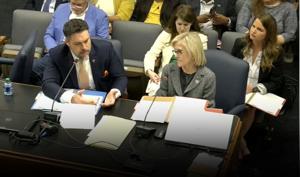Mississippi News
A look at the Senate medical marijuana bill
Senate vote on Mississippi medical marijuana bill expected Thursday. Here’s a look at the bill.
After years of debate and hang-fire, a Mississippi medical marijuana program for people with chronic and debilitating illnesses inched forward Wednesday, with a Senate committee passing a bill along to the full chamber.
A vote by the full Senate chamber is expected Thursday. Passage there would send it to the House, where some political observers say its passage is less assured. Last week, House Speaker Philip Gunn said “candidly, that is not a top issue for us.” Gov. Tate Reeves has been critical of an earlier version of the bill as allowing patients too much marijuana and refused to call a special legislative session for it this summer and fall. In a late change, the amount was reduced slightly, but it is unclear if that would prevent a Reeves veto.
“The more we tinker with this, the longer we debate it, the longer the delay for the people who voted for this and the patients who need this program,” Sen. Kevin Blackwell, R-Southaven — who has worked for months crafting the measure — said as he fended off attempted amendments in committee.
Lawmakers are attempting to reenact a medical marijuana program after voters overwhelmingly passed one in 2020, only to have it shot down on a technicality by the state Supreme Court. But the Legislature in this conservative state has struggled for years with the issue, despite growing voter sentiment — and even a citizen-passed ballot initiative — that the state join most others in legalizing marijuana for medical use.
“It’s probably not a perfect bill, but we tried to be conservative, take the intent of (voters’) Initiative 65 and keep it within that framework,” Blackwell said. He said he and other legislative leaders looked closely at other states’ programs to learn best practices and what to avoid. The Senate Public Health Committee held hearings over the summer on the issue.
“We did a number of things to prevent us becoming Oklahoma,” Blackwell said. The Sooner State has a medical program that has become a de facto recreational one and has had problems with people abusing the system and black market and organized crime infiltration.
READ MORE: How regulated should Mississippi medical marijuana be?
Blackwell said it is estimated about 24,000 Mississippians will qualify for medical marijuana use in the first year of the program, increasing to about 125,000 within five years.
Angie Calhoun, founder of the Mississippi Cannabis Patients Alliance and a proponent of Initiative 65, said she was satisfied with the version of the bill approved by committee on Wednesday and cautiously optimistic about its passage into law.
“I think Sen. Blackwell has done an amazing job with this, and I know he’s done a lot of hard work,” Calhoun said. “As he said, the longer we postpone this, the longer patients who are suffering have to wait.”
She said she and her group have tried to talk with Reeves, but have “been unable to get a response.”
READ MORE: Gov. Tate Reeves dodging on promised medical marijuana session
Sen. Barbara Blackmon, D-Canton, unsuccessfully tried to amend the bill in committee Wednesday to allow outdoor growing, which she said would help Mississippi farmers more easily get into the business, which she said is a “new cash cow.” She also unsuccessfully tried to amend the measure to require “equity” and give preference to minorities with new cannabis businesses in Mississippi.
State Rep. Lee Yancey, R-Brandon, has worked with Blackwell on the measure for months and is leading the House movement for its passage there.
“I think we’re ready to get it through the House,” Yancey said. “I anticipate a conclusion soon to this long process. I’m very proud of Sen. Blackwell and the yeoman’s work he has done on this. I am looking forward to patients having another option besides opioids.”
Some particulars of Senate Bill 2095, the Mississippi Medical Cannabis Act of 2022:
- Allows patients to receive up to 3.5 ounces of marijuana a month. Initiative 65 would have allowed up to 5 ounces a month. An earlier draft of the new bill would have allowed up to 4 ounces, but was reduced in late negotiations. Gov. Reeves had voiced opposition — and threatened a veto — over the 4 ounces. He had proposed cutting that amount in half, then later allowing maximum dosing only by physicians, not other practitioners.
- Allows people to receive medical marijuana for the 22 conditions listed in Initiative 65, such as cancer and epilepsy, and adds hepatitis, Alzheimer’s disease and spastic quadriplegia. It also allows it as treatment for chronic, debilitating pain. Conditions can be added to the list only by the Department of Health, not doctors.
- Allows physicians, certified nurse practitioners, physician’s assistants and optometrists to certify patients for cannabis use. A patient has to have an in-person assessment, a “bona fide relationship” with the practitioner and a follow up assessment within six months. Only physicians can certify minors for use. For people aged 18-25 — most susceptible to abuse of the drug, Blackwell said — a doctor plus another practitioner have to sign off on certification.
- Creates a “seed-to-sale” tracking system of marijuana production and sales, with strict reporting requirements for practitioners and cannabis businesses. It also provides criminal penalties and imprisonment for violations. It requires growing to be done indoors, which Blackwell said makes regulation easier and prevent black market and organized crime problems other states have seen.
- Applies the state sales tax (currently 7%) to retail sales of cannabis. Applies a 5% excise for cultivation. Money collected goes into the state general fund.
- Allows the governing boards of cities or counties to opt out of allowing medical cannabis by a vote within 90 days of passage of the act. If they opt out, citizens can opt the city or county back in by referendum.
- Prohibits any lawmaker or their spouses from having an interest in a cannabis business in Mississippi for one year. He said that with a part-time, citizen Legislature such a prohibition shouldn’t be permanent, but would prevent a conflict for lawmakers voting to enact the program.
- Cannabis businesses can be located in any areas with commercial zoning, but cannot be within 1,000 feet of a school, church or daycare, and dispensaries cannot be closer than 1,500 feet to each other. Cities or counties can require cannabis businesses to get licenses, permits or registration.
- Will not prevent any employer from firing or refusing to hire someone who is using medical cannabis, or from having drug testing policies. Landlords are not required to allow medical cannabis production or use in rental property.
- Prevents people losing custodial or visitation rights with their children for use of medical cannabis, and says users shall not be denied the right to purchase or possess a firearm. This has been an issue in other states, and federal firearms regulations prohibit marijuana use.
- Creates a tier system of cultivators and fees. This starts with a “micro-cultivator” of 1,000 square feet or less, with a one-time license fee of $1,500 and an annual renewal fee of $2,000 and goes up to a “tier 6” grower of 100,000 square feet or more, with a license fee of $40,000 and an annual renewal fee of $100,000. A similar tiered system and fees apply to dispensaries.
- Requires the Health Department to begin issuing cards to patients within 60 days of passage of the measure, and requires start of licensing of growers within 120 days and dispensaries within 150 days.
- Creates a nine-member medical cannabis advisory committee to monitor the program, with three members each appointed by the governor, lieutenant governor and House speaker.
This article first appeared on Mississippi Today and is republished here under a Creative Commons license.
Mississippi News
Events happening this weekend in Mississippi: April 25-27
SUMMARY: This weekend in Mississippi (April 25-27) features a variety of events across Central and Pine Belt regions. Highlights include MiraGotSoul at Vibe Studio in Jackson, a community Dinner and Movie in Clinton, and the Natchez Kite Festival. Enjoy live performances with Sweet Lizzy Project in Natchez and the New Bourbon Street Jazz Band in Clinton. Family-friendly activities include the Native Plant Fest and Community Farmers Market in Jackson. In Hattiesburg, catch the Henry Cho tour and the Downtown Crawfish Jam Music Festival. Overall, it’s a weekend full of entertainment, culture, and fun activities for all ages.
The post Events happening this weekend in Mississippi: April 25-27 appeared first on www.wjtv.com
Mississippi News
Events happening this weekend in Mississippi: April 18-20
SUMMARY: This weekend (April 18-20), Mississippi offers a variety of events for all ages. In Jackson, enjoy Food Truck Friday, a jazz concert, free outdoor movie screenings, and multiple exhibitions including “Of Salt and Spirit” and “Hurricane Katrina: Mississippi Remembers.” For family fun, there’s an Easter Egg Hunt at the Ag Museum and “Bunnies & Butterflies” at MCM. Natchez features the Spring Pilgrimage, Lafayette’s 200th anniversary celebration, and a farmers market. In the Pine Belt, highlights include Live at Five, a Spring Candle-Making Workshop, and Easter events at the Hattiesburg Zoo. Don’t miss the Bluff City Block Party and more!
The post Events happening this weekend in Mississippi: April 18-20 appeared first on www.wjtv.com
Mississippi News
Events happening this weekend in Mississippi: April 11-13
SUMMARY: This weekend in Mississippi (April 11-13), enjoy a variety of events across the state. Highlights include the Eudora Welty Birthday Bash in Jackson, Trivia Night at the Mississippi Museum of Natural Science, and Boots & Bling Fundraiser in Natchez. For family fun, check out the Bunny Bonanza in Jackson or the Easter Egg Hunt in Clinton. The Natchez Concours d’Elegance Car Show and Stranger Than Fiction Film Festival offer cultural experiences, while the 12th Annual Dragon Boat Regatta in Ridgeland and the Hub City Classic Car Show in Hattiesburg provide exciting activities for all ages.
The post Events happening this weekend in Mississippi: April 11-13 appeared first on www.wjtv.com
-

 SuperTalk FM7 days ago
SuperTalk FM7 days agoNew Amazon dock operations facility to bring 1,000 jobs to Marshall County
-

 News from the South - Missouri News Feed3 days ago
News from the South - Missouri News Feed3 days agoMissouri lawmakers on the cusp of legalizing housing discrimination
-

 Mississippi Today2 days ago
Mississippi Today2 days agoDerrick Simmons: Monday’s Confederate Memorial Day recognition is awful for Mississippians
-

 Mississippi Today5 days ago
Mississippi Today5 days agoStruggling water, sewer systems impose ‘astronomic’ rate hikes
-

 News from the South - West Virginia News Feed5 days ago
News from the South - West Virginia News Feed5 days agoIs West Virginia — and the rest of the country — prepared to care for our seniors?
-

 Mississippi Today5 days ago
Mississippi Today5 days agoParents, providers urge use of unspent TANF for child care
-

 News from the South - Arkansas News Feed7 days ago
News from the South - Arkansas News Feed7 days agoOp-Ed: Another dismal year for ranked-choice voting | Opinion
-

 News from the South - Florida News Feed4 days ago
News from the South - Florida News Feed4 days agoFlorida woman accused of setting fires during burn ban

















































